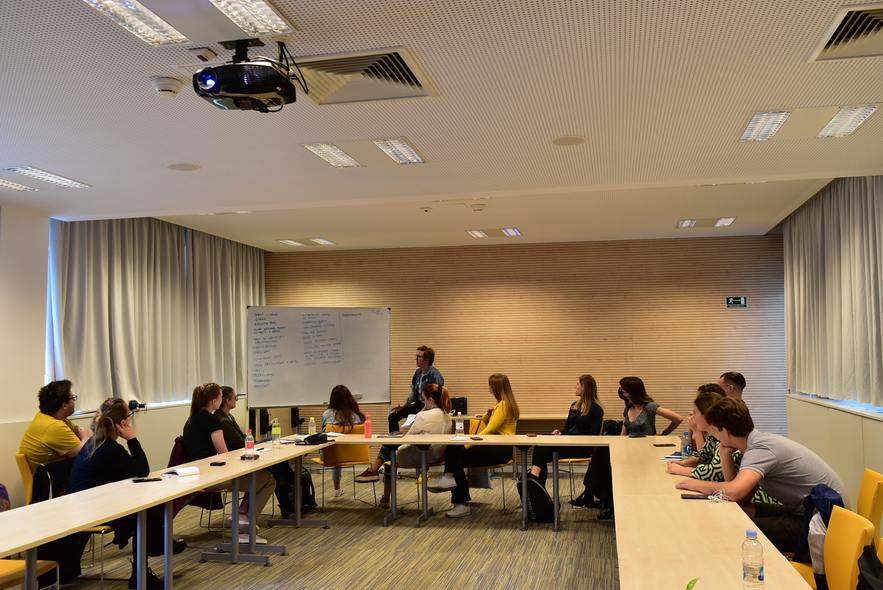Zagreb, June 30, 2022
Between June 8th and 10th, 2022, we held the Educational-Activist Transitional Justice School “Where Were You in 2022?” which brought together eighteen young people from Croatia and Bosnia and Herzegovina.
After getting to know each other and introducing the program, the school started with the lecture “Introduction to Transitional Justice” led by Branka Vierda, program director of the Youth Initiative for Human Rights – Croatia and Marko Milosavljevic, program coordinator of the Youth Initiative for Human Rights in Serbia. During this lecture, participants had the opportunity to learn about the mechanisms of transitional justice, including criminal justice, truth commissions, material and symbolic reparations, and institutional reform, drawing on examples related to the former Yugoslavia and other international examples.
On the second day of school, the participants had the opportunity to visit the City Assembly of the City of Zagreb together with members of the Political Youth Network, participants of the regional conference “Leading Together: Regional Cooperation for Sustainable Peace”.
Member of the City Assembly, Nikola Vukobratović, talked to young people on the topic “Institutional Struggle for a Better Social Status of National Minorities: Challenges and Advantages”, referring to the powers and competencies of the Committee for National Minorities, the extent of the institutional struggle for a better status of Serbian national minority at the city level, and expectations from the local government in Zagreb in the context of achieving a better status for the Serbian national minority.
Viktor Koska from the Office of the Deputy Prime Minister of the Republic of Croatia in charge of social issues and human and minority rights lectured on “Cooperation between CSOs and the Executive in the Protection and Promotion of Human Rights – a Realistic Expectation or Unreasonable Hope.” As part of the lecture, he spoke about the prospects for cooperation between government officials at the national level and civil society organizations in advocating and exercising human rights. He also commented on the positive and negative sides of Croatia’s membership in the European Union in the field of human rights, with emphasis on the rights of national minorities, but also shared thoughts on opportunities for Croatia’s more positive contribution to the Western Balkan countries based on its EU membership.
On the same day, participants listened to a lecture by Takeh Sendza, Legal Officer at the International Residual Mechanism for Criminal Tribunals, who gave his views on the role and responsibilities of journalists, editors, and media outlets during the Rwanda genocide based on judgments handed down before the International Criminal Tribunal for Rwanda with reference to the role of the media in specific pre-war, war and post-war periods as well as the impact of criminal proceedings on today’s media coverage in Rwanda.
At the end of the second day, participants joined the presentation of the book “Shared Narratives: Supporting Reconciliation by Bridging Differences in Divided Narratives” where they had the opportunity to hear the experiences of five young people from the region (Serbia, Montenegro, Bosnia and Herzegovina, Kosovo and Croatia) participated in the writing of the book Shared Narratives with the aim of a joint critical review of existing formal and informal versions of the history of the wars of the 1990s.
Photo: Sanja Bistricic
We continued to deal with similar topics during the third day of school, which began with a lecture by Sven Milekić, a doctoral student at Maynooth University, on the relationship between dominant narratives and national myths in Croatia and Serbia. Special emphasis was placed on VRO Oluja, and the different memory politics that remember this event within the dominant narratives in Croatia and Serbia.
The last session of the school included a panel discussion on the contribution of youth activism to the development of post-conflict societies. Ivana Blagušević, a volunteer of the Youth Initiative for Human Rights, spoke about her experience in researching political excuses, while Isabell Radešić shared more about her winning conceptual design for commemorating civilian war victims in a competition held by the Youth Initiative for Human Rights in 2021. Nikola Kožul spoke about his long-term engagement with the Youth Initiative for Human Rights and various activist endeavors in the field of human rights, from supporting the RECOM initiative to acting in the field of environmental policies.
We would like to thank all the participants and lecturers who helped make the the Educational-Activist Transitional Justice School “Where Were You in 2022?” successful, educational, and inspiring!
The School of Transitional Justice activity is part of the 4O project: Discovering, Awareness, Empowerment and Human Rights Organization with a total value of € 170,147, of which € 149,922.00 was provided through financial support from Iceland, Liechtenstein and Norway under EEA grants.
